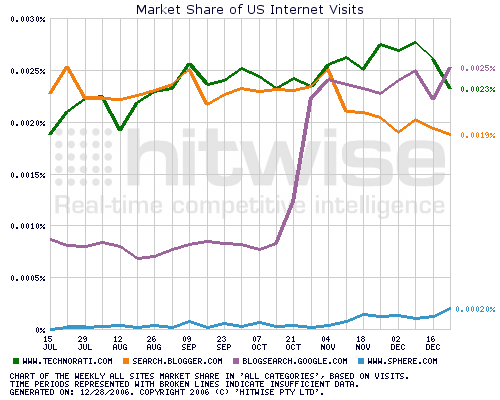About 2 months ago, HitWise
published a report stating that Technorati, the
leading blog search company, had for the first time fallen behind Google BlogSearch in traffic. The reason was
Google’s new strategy of pushing Google BlogSearch on the Google News homepage. A quite
unfair competition for Technorati, but this was an expected and very natural move for
Google. So in this article, we take Technorati under the microscope – looking at their
technologies, strategies and ultimately their exit options.
Source: Hitwise

Technorati vs Google – Blog Search vs Regular Web Search
The Technorati vs Google question is equivalent to the Blog Search vs Web Search
question. But while in regular web search, relevancy is the key parameter; in blog
search, it is only a secondary parameter. The most important aspect of a blog search
result is its actuality. In other words, time is the primary parameter in
Blog Search.
The best way of keeping up with latest reactions in the blogosphere is having a good
ping database – and that was the sole reason why Yahoo snapped up open source ping service Blo.gs in 2005. Technorati, as the most popular blog search
player and one of the earliest entrants in this market, should have a great ping
database. On the other hand, Google’s page rank algorithms are not so handy in this
race.
However, Google’s vast resources are definitely something that Technorati is missing.
Technorati is known for their unhealthy infrastructure, that results in frequent annoying
outages. We only need to look at what happened to Friendster, where their technical
issues (amongst other things) gave a big opportunity to their competitors – particularly,
as it turned out, MySpace.
Technorati’s Bloated Design
Technorati has a relatively bloated design, at least in comparison to the sparseness
of Google’s UI. This is a sign of their courage and self-confidence. Technorati was born
in the time of Google’s PR honeymoon, when everyone was talking about the supremacy of
Google’s simplistic and lightweight design choices. At that time people were also saying
that Yahoo had lost the game, because of their design and page sizes. This is why all of
the early blog search ventures, like Feedster, followed Google’s rules and chose similar
minimalist patterns.
But Technorati was the only one that recognized that blog search is completely
different from web search. Unlike regular search, blog search is a social thing – so it
requires more social elements. That’s why Technorati’s design has always been emotive and
they have chosen to “bloat” their homepage with features like popular searches and
‘Featured Bloggers’.
Technorati Tools
Another great asset of Technorati is their blogger-friendly utilities and blog
popularity ranking. These tools have made Technorati a unique blogging authority and a
site for all bloggers to keep their eye on.
The latest add-on, WTF? (supposedly
standing for “Where’s the fire?”), is a buzz indicator and aims to make Technorati the
Wikipedia of topics. It’s a very new feature and has a long way to go.
Microformats Advocacy
Another differentiating feature of Technorati is their strong advocacy and leadership
in microformats. Very briefly, microformats add semantics to HTML markup – to take it
from being machine readable to being machine understandable.
Technorati’s relationship with microformats is similar to Six Apart and OpenID – it is
beneficial from a business perspective as well as being good for the Web. Technorati’s
CTO Tantek Celik is a prominent player in the world of
microformats and is also a founder of the Global Multimedia
Protocols Group.
Exit?
Now the big question is: what will be the exit of this small San Francisco based
company? An IPO, an acquisition? No one knows, but there are some obvious
considerations:
- Technorati may be a big opportunity for existing search companies, like Yahoo, to
extend their success to blog search. Just imagine if Technorati had a web search option,
wouldn’t you start using it? Search is not just a technology game, as we stated
in our previous article. The gap between search technologies is getting smaller. It’s
becoming more about habits, and most authorities like Compete and Alexa say that an increasing amount of people have
gotten addicted to Technorati’s blog search. - Technorati is also a social company and a blogging authority. So any company
interested in social media startups may be interested in Technorati as well. Viacom and
News Corp are known to be hungry for that. - Technorati may not be financially healthy. They struggle under high loads and they lost a valuable employee last
month to Google. They are keeping track of millions of blogs, so their burn rate is
probably high (while that doesn’t imply an exit, it may lead to another round of
financing soon).
Michael Arrington posted
similar predictions one year ago, but nothing has happened since then. So we light the
flame one more time – when will Technorati be acquired?

















